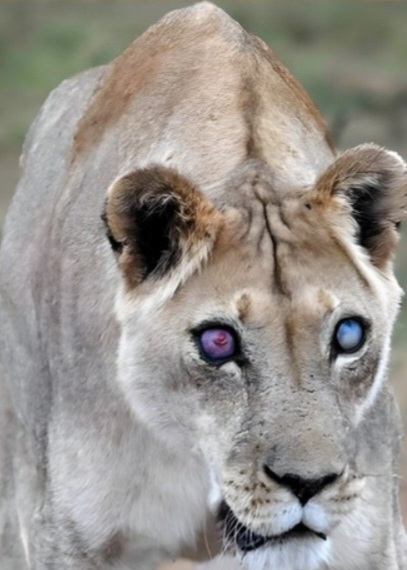By Abdullahi Inuwa
Deep in the heart of the African savannah, where survival depends on keen eyesight and sharp instincts, lives a lioness whose story has touched hearts around the world. For five long years, she has roamed the wild alone—blind, but unbroken.
Her world is one of sound, scent, and courage. Once part of a thriving pride, she lost her sight after a severe eye infection, a condition that would have spelled the end for most animals in her world. Yet, against all odds, she refused to give up. Today, she stands as a living symbol of strength and resilience, proving that even in the most unforgiving wilderness, the spirit to survive can outshine any limitation.
Locals in the nearby villages call her Nia, meaning “purpose” in Swahili—a fitting name for a creature who has found her way despite losing what many would consider essential for life. Rangers first noticed her years ago when she began wandering alone, separated from her pride. Many feared she wouldn’t last long, but as months turned into years, Nia’s story became one of quiet triumph.
Without her sight, Nia learned to navigate the savannah through her other senses. Her ears became finely tuned instruments, catching the rustle of leaves and the distant call of prey. Her nose, sensitive to the faintest scent, became her guide through the maze of the wild. When danger lurks—whether it’s a rival predator or the stealthy approach of a human—she senses it before it reaches her.
“She’s remarkable,” says park ranger Daniel Maseko, who has followed her story for years. “Most lions rely heavily on sight for hunting and protection, but she’s developed a completely different way to live. She listens, she smells, and somehow, she always finds her way.”
Each hunt is a test of patience and instinct. While other lions charge at the sight of prey, Nia waits. She crouches low, letting the wind carry the scent of antelope or warthog. When she’s sure of her target, she moves silently, guided not by vision, but by the rhythm of life around her. Sometimes she fails, but she tries again—and that determination has kept her alive.
Her survival also challenges common assumptions about nature’s harshness. Though the wild is indeed cruel, it also has space for extraordinary stories of adaptation and persistence. Over time, even other animals in her territory seem to have accepted her quiet presence. She’s not a dominant hunter, but she’s not helpless either.
“Predators like her usually don’t last this long,” Maseko continues. “But Nia’s story reminds us that nature isn’t always predictable. There’s resilience in every creature if you look closely enough.”
When the sun sets over the golden grasslands, Nia rests beneath the acacia trees, her blind eyes fixed on a world she cannot see but can still feel. The breeze carries the scent of the earth and the distant roar of other lions—her kind, her kin, though long separated. She responds with a low growl, not of anger, but of belonging.
Wildlife experts believe her survival has lessons far beyond the savannah. In a world where even the strongest often fall to challenges, Nia stands as a quiet teacher. Her blindness, once seen as a weakness, has become a story of adaptation and courage—a reminder that every obstacle can be turned into a strength.
Her story has inspired countless people who have heard it. “She represents hope,” says wildlife photographer Aisha Kamau, who captured a now-famous image of Nia standing alone against a sunset. “In her, I see a reflection of everyone who’s been told they can’t make it, yet keeps pushing forward.”
Indeed, Nia’s life mirrors human struggles—those silent battles fought daily in the face of loss, illness, or limitation. Like her, people everywhere face challenges that seem impossible. Yet her journey reminds us that perseverance, not perfection, defines true strength.
While researchers and conservationists continue to monitor her from a distance, they have chosen not to interfere. “She’s surviving on her own terms,” Kamau explains. “It’s her story, her fight. We’re just witnesses.”
As dawn breaks over the plains, the first rays of sunlight fall upon her tawny coat. She rises slowly, stretching her powerful frame. Somewhere in the tall grass, the sound of movement catches her attention. She turns her head, ears flicking, nostrils flaring. The hunt begins again.
For Nia, each day is uncertain, but she faces it with the quiet confidence of one who has already overcome the impossible. Her blindness does not define her—her spirit does.
In the vast wilderness where only the fittest survive, this blind lioness has proven that strength is not measured by sight or speed, but by the will to keep going. Her story is not just about survival—it is about purpose, courage, and the unyielding power of life itself.
And as long as she walks the golden plains of Africa, the world will remember her not as a victim of fate, but as a testament to resilience—a lioness who may have lost her sight, but never her vision.
Abdullahi Inuwa Social Commentator ainuwa303@gmail.com



so touching